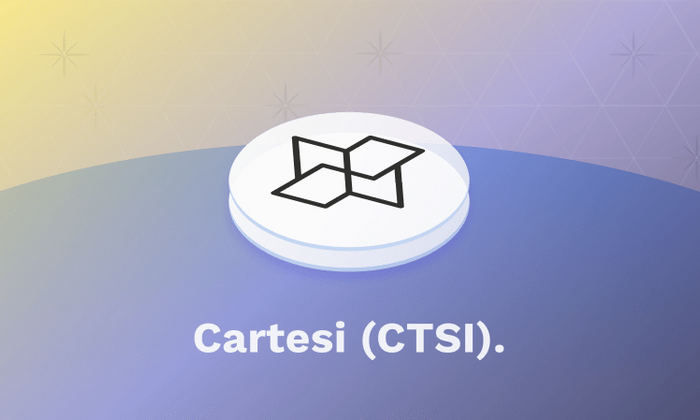-
 Bitcoin
Bitcoin $85,181.4576
0.55% -
 Ethereum
Ethereum $1,600.7372
0.98% -
 Tether USDt
Tether USDt $0.9999
0.01% -
 XRP
XRP $2.0883
0.92% -
 BNB
BNB $592.4828
0.74% -
 Solana
Solana $138.7084
2.67% -
 USDC
USDC $0.9999
0.00% -
 Dogecoin
Dogecoin $0.1590
2.50% -
 TRON
TRON $0.2418
-1.18% -
 Cardano
Cardano $0.6301
2.59% -
 UNUS SED LEO
UNUS SED LEO $9.3588
1.36% -
 Chainlink
Chainlink $12.8630
1.65% -
 Avalanche
Avalanche $19.5072
1.68% -
 Stellar
Stellar $0.2468
2.21% -
 Toncoin
Toncoin $2.9911
-0.01% -
 Shiba Inu
Shiba Inu $0.0...01220
2.08% -
 Hedera
Hedera $0.1663
0.29% -
 Sui
Sui $2.1506
1.41% -
 Bitcoin Cash
Bitcoin Cash $338.3770
2.53% -
 Hyperliquid
Hyperliquid $18.1017
6.61% -
 Polkadot
Polkadot $3.7270
1.24% -
 Litecoin
Litecoin $76.2040
0.93% -
 Dai
Dai $1.0000
0.02% -
 Bitget Token
Bitget Token $4.4577
2.21% -
 Ethena USDe
Ethena USDe $0.9992
0.02% -
 Pi
Pi $0.6468
6.09% -
 Monero
Monero $212.8810
-1.80% -
 Uniswap
Uniswap $5.2693
1.19% -
 Pepe
Pepe $0.0...07270
1.33% -
 OKB
OKB $50.7701
1.10%
What is the issuance amount of CTSI coins?
Cartesi's (CTSI) total coin supply is set at 1,000,000,000, ensuring controlled issuance through a predefined emission schedule.
Nov 25, 2024 at 11:50 pm

What is the Issuance Amount of CTSI Coins?
Introduction
Cartesi (CTSI) is a blockchain platform designed to bring mainstream adoption of decentralized applications (dApps) by addressing the limitations of existing blockchain solutions. It offers a decentralized compute network that enables developers to create and deploy complex dApps on a scalable and cost-effective platform. The issuance amount of CTSI coins, which are the native cryptocurrency of the Cartesi ecosystem, is a crucial aspect to understand for potential investors and users. This article will delve into the details of the CTSI coin issuance, including the total supply, distribution, and emission schedule.
Total Supply of CTSI Coins
The total supply of CTSI coins is 1,000,000,000. This fixed supply ensures that the scarcity and value of CTSI coins are maintained over time. The issuance of new coins is controlled through a pre-determined emission schedule to prevent inflation and stabilize the coin's value.
Distribution of CTSI Coins
The distribution of CTSI coins was conducted through a combination of public and private sales. The following is the breakdown of the coin distribution:
- Public Sale (Seed Round): 10% of the total supply (100,000,000 CTSI) was allocated to early investors during the seed round.
- Private Sale: 20% of the total supply (200,000,000 CTSI) was allocated to private investors who contributed to the project's development.
- Team and Advisors: 20% of the total supply (200,000,000 CTSI) was reserved for the core team members and advisors responsible for developing and maintaining the Cartesi platform.
- Ecosystem and Reserve: 30% of the total supply (300,000,000 CTSI) is allocated for ecosystem development, partnerships, and community initiatives.
- Foundation: 20% of the total supply (200,000,000 CTSI) is reserved for the Cartesi Foundation, a non-profit organization dedicated to supporting the long-term success and adoption of the Cartesi platform.
Emission Schedule for CTSI Coins
The emission schedule for CTSI coins is designed to ensure a controlled and gradual release of new coins into the market. The issuance of new coins is aligned with the growth and adoption of the Cartesi platform. The following is the breakdown of the emission schedule:
- Initial Emission: During the initial launch of the Cartesi platform, a significant portion of the total supply (400,000,000 CTSI) is released to the market to establish liquidity and provide incentives for early adopters.
- Linear Release: After the initial emission, new CTSI coins are released into the market at a predefined rate over a specified period of time. This linear release helps maintain stability and prevents excessive fluctuations in the coin's value.
- Adaptive Release: As the Cartesi ecosystem grows and matures, the emission schedule may be adjusted to align with the adoption rate and demand for CTSI coins. The adaptive release allows for flexibility in the issuance to ensure the long-term sustainability of the platform.
Conclusion
The issuance amount of CTSI coins plays a vital role in determining the scarcity
Disclaimer:info@kdj.com
The information provided is not trading advice. kdj.com does not assume any responsibility for any investments made based on the information provided in this article. Cryptocurrencies are highly volatile and it is highly recommended that you invest with caution after thorough research!
If you believe that the content used on this website infringes your copyright, please contact us immediately (info@kdj.com) and we will delete it promptly.
- SUI Stuck in No Man's Land as Bitcoin Dominance Rises
- 2025-04-19 16:20:13
- MoonPay CEO Calls on US Lawmakers to Leave a Path Open to State-Level Regulators When Passing Legislation on Stablecoins
- 2025-04-19 16:20:13
- XploraDEX's $XPL Token Presale Enters Final Phase as FOMO Reaches Boiling Point
- 2025-04-19 16:15:13
- Mjpru Result 2025: Mahatma Jyotiba Phule Rohilkhand University Declared the Last SEMESTER Exam Results
- 2025-04-19 16:15:13
- The DeFi Education Fund (DEF) Submitted a Letter to the SEC Proposing Five Core Principles for Creating a "Token Safe Harbor" Framework
- 2025-04-19 16:10:13
- King Charles III's Easter message from Durham Cathedral fails to honour the Christian essence of Holy Week
- 2025-04-19 16:10:13
Related knowledge

Will the Bitcoin payment platform affect the payment business of traditional banks?
Apr 19,2025 at 09:56am
The emergence of Bitcoin and other cryptocurrencies has sparked a significant debate about their impact on the traditional financial sector, particularly on the payment business of banks. The Bitcoin payment platform, with its decentralized nature and promise of lower transaction fees, poses both a challenge and an opportunity for traditional banks. Thi...

Which industries are most suitable for using Bitcoin payment platforms? Successful case sharing**
Apr 19,2025 at 04:01pm
Bitcoin, as a decentralized digital currency, has seen increasing adoption across various industries. The use of Bitcoin payment platforms offers several advantages, including lower transaction fees, faster processing times, and enhanced security. This article explores the industries most suitable for using Bitcoin payment platforms and shares successfu...

How to avoid address input errors when using Bitcoin payment platforms?
Apr 19,2025 at 02:15am
When using Bitcoin payment platforms, avoiding address input errors is crucial to ensure your transactions are secure and reach the intended recipient. Address input errors can lead to loss of funds, as Bitcoin transactions are irreversible. This article will guide you through various methods and best practices to prevent such mistakes. Understanding Bi...

What are the advantages of Bitcoin payment platforms in cross-border transactions?
Apr 19,2025 at 01:35pm
Bitcoin payment platforms have emerged as a revolutionary tool for cross-border transactions, offering numerous advantages that traditional banking systems struggle to match. In this article, we will explore the key benefits of using Bitcoin payment platforms for international payments, focusing on speed, cost, accessibility, security, and transparency....

Why are more and more merchants accepting Bitcoin payments?
Apr 19,2025 at 12:29pm
The increasing acceptance of Bitcoin as a payment method by merchants is a notable trend within the cryptocurrency circle. This shift is driven by several key factors that make Bitcoin an attractive option for businesses. Understanding these factors can provide insights into the growing acceptance of Bitcoin payments. Benefits of Lower Transaction FeesO...

How to avoid slippage in SOL transactions?
Apr 19,2025 at 12:15pm
Slippage in cryptocurrency transactions, particularly in Solana (SOL) transactions, refers to the difference between the expected price of a trade and the price at which the trade is actually executed. Slippage can occur due to various factors such as market volatility, liquidity, and the size of the transaction. For traders and investors dealing with S...

Will the Bitcoin payment platform affect the payment business of traditional banks?
Apr 19,2025 at 09:56am
The emergence of Bitcoin and other cryptocurrencies has sparked a significant debate about their impact on the traditional financial sector, particularly on the payment business of banks. The Bitcoin payment platform, with its decentralized nature and promise of lower transaction fees, poses both a challenge and an opportunity for traditional banks. Thi...

Which industries are most suitable for using Bitcoin payment platforms? Successful case sharing**
Apr 19,2025 at 04:01pm
Bitcoin, as a decentralized digital currency, has seen increasing adoption across various industries. The use of Bitcoin payment platforms offers several advantages, including lower transaction fees, faster processing times, and enhanced security. This article explores the industries most suitable for using Bitcoin payment platforms and shares successfu...

How to avoid address input errors when using Bitcoin payment platforms?
Apr 19,2025 at 02:15am
When using Bitcoin payment platforms, avoiding address input errors is crucial to ensure your transactions are secure and reach the intended recipient. Address input errors can lead to loss of funds, as Bitcoin transactions are irreversible. This article will guide you through various methods and best practices to prevent such mistakes. Understanding Bi...

What are the advantages of Bitcoin payment platforms in cross-border transactions?
Apr 19,2025 at 01:35pm
Bitcoin payment platforms have emerged as a revolutionary tool for cross-border transactions, offering numerous advantages that traditional banking systems struggle to match. In this article, we will explore the key benefits of using Bitcoin payment platforms for international payments, focusing on speed, cost, accessibility, security, and transparency....

Why are more and more merchants accepting Bitcoin payments?
Apr 19,2025 at 12:29pm
The increasing acceptance of Bitcoin as a payment method by merchants is a notable trend within the cryptocurrency circle. This shift is driven by several key factors that make Bitcoin an attractive option for businesses. Understanding these factors can provide insights into the growing acceptance of Bitcoin payments. Benefits of Lower Transaction FeesO...

How to avoid slippage in SOL transactions?
Apr 19,2025 at 12:15pm
Slippage in cryptocurrency transactions, particularly in Solana (SOL) transactions, refers to the difference between the expected price of a trade and the price at which the trade is actually executed. Slippage can occur due to various factors such as market volatility, liquidity, and the size of the transaction. For traders and investors dealing with S...
See all articles
























































































